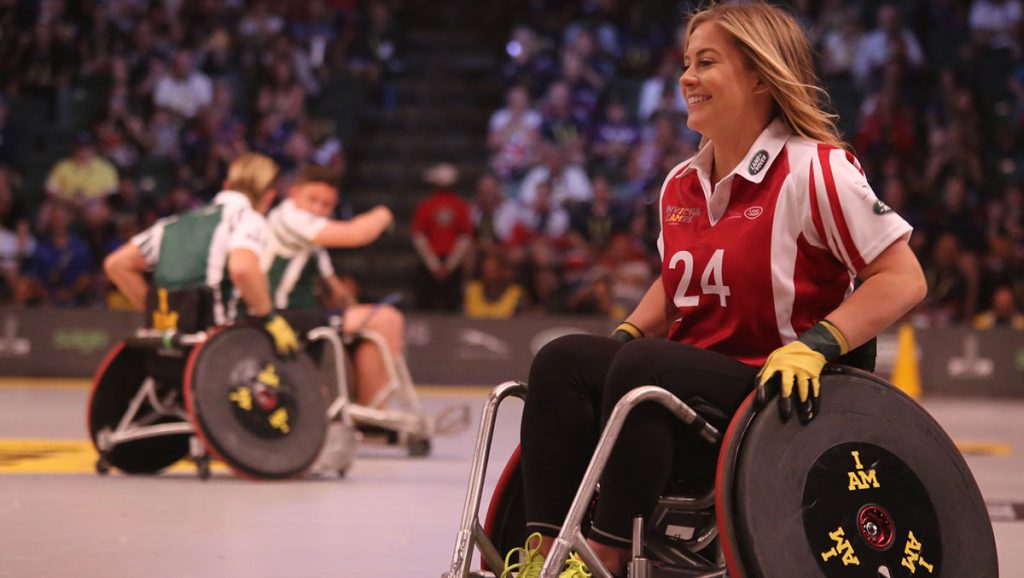Table of Contents
- 6 VA Adaptive Sports Programs
- What Are VA Adaptive Games?
- National Veterans Creative Arts Competition and Festival
- National Disabled Veterans Golf Clinic
- National Veterans Summer Sports Clinic
- National Disabled Veterans Winter Sports Clinic
- National Veterans Wheelchair Games
- National Veterans Golden Age Games
- What Is the Adaptive Sports Grant Program?
- What Is the Athlete Stipend Program?
- Benefits of VA Adaptive Sports
Adaptive sports and therapeutic arts play a huge role in the rehabilitation plans of veterans treated at the VA. For this reason, the VA has developed several adaptive sports programs to allow disabled veterans a way to explore the life-changing world of adaptive sports.
6 VA Adaptive Sports Programs
- National Veterans Creative Arts Competition and Festival
- National Disabled Veterans Golf Clinic
- National Veterans Summer Sports Clinic
- National Disabled Veterans Winter Sports Clinic
- National Veterans Wheelchair Games
- National Veterans Golden Age Games
Many veteran participants say they have gained a greater sense of independence and self-confidence from adaptive sports along with increased physical activity. These six programs allow veterans to experience a new sport or connect with an old sport in a new way.
What Are VA Adaptive Games?
Adaptive games are sports and activities that are customized to fit the needs of disabled athletes to maximize their participation and enjoyment of the game. Adaptive sports and therapeutic arts are widely used in rehabilitation programs to improve the physical, social, and emotional well-being of disabled veterans. The VA has long embraced these methods to enhance the quality of life for the veterans they serve.
The VA offers six specific adaptive programs to introduce veterans to new activities and challenge them to remove perceived barriers imposed by their disabilities. The programs are held in several locations throughout the country to expose as many veterans as possible across a wide geographical area.
Who can participate in VA Adaptive Games? These programs are open to veterans using the VA health care system, receiving VA disability benefits, or who meet the disability criteria outlined by each program.
It’s not only veterans who benefit from these games. Many lives are enriched by the connection and community fostered by these games. It takes an entire community of corporate partners, sponsors, veteran service organizations, medical professionals, volunteers, and spectators to make these adaptive sports events the success they are today.
National Veterans Creative Arts Competition and Festival
Creative arts therapy is one of the many effective tools that rehabilitation experts use to treat orthopedic, cognitive, and emotional medical conditions. The National Veterans Creative Arts Competition encourages veterans to grow through self-expression. Competition winners are showcased at the annual festival held in a different location each year. The VA co-hosts this program with the American Legion Auxiliary.
Veterans compete at local VA clinic competitions, and first-place winners advance nationally. Categories include a wide range of arts from painting to leatherwork, including creative writing, drama, dance, and music.
The festival originated at two separate festivals in 1981 – one celebrating the visual arts and one music. The two festivals combined in 1989 and the Veterans Creative Arts Festival was born. The event has grown to include 3,600 entries from 150 VA clinics.
Veterans who participate say that art has helped them release anxiety, heal from traumatic memories, and connect with other comrades.
National Disabled Veterans Golf Clinic
The National Disabled Veterans Golf Clinic in Iowa City, co-hosted by the Disabled American Veterans (DAV), is a week-long adaptive golf program for veterans living with severe disabilities. In addition to golf, veterans experience other adaptive sports such as bowling, air rifle, bicycling, and kayaking.
Initially called TEE (Training, Exposure, Experience), a few employees and veterans created the clinic at the Iowa City VA Medical Center in 1994. The clinic seeks to showcase golf’s rehabilitative and therapeutic qualities, making it accessible to all disabled veterans. Due to its popularity and effectiveness, it has grown to be one of six adaptive sports in the VA Adaptive Sports system.
Veterans must submit an application during open registration to be selected to attend the clinic. The many activities veterans will be exposed to during the clinic are designed to show them they can live an active life regardless of physical limitations. Participants report an increase in self-confidence and fulfillment after attending the golf clinic.
National Veterans Summer Sports Clinic
For veterans looking for the thrill of summer sports in a sunny location, the National Veterans Summer Sports Clinic is just what the doctor ordered. Located in San Diego, CA, this clinic offers disabled veterans the chance to discover the rehabilitative value of summer sports.
Various summer sports are offered, including surfing, sailing, kayaking, and cycling. The clinic also introduces veterans to adaptive fitness and teaches techniques beyond the clinic to enhance their everyday lives.
The clinic is open to disabled veterans experiencing TBI, PTSD, spinal cord injuries, visual impairment, amputations, and other severe disabilities. Clinic activities allow disabled veterans to try a new sport or reconnect with a sport they enjoyed before the injury. Many say they have significantly benefited from the time in the sun and fresh air, creating new stories to share and building relationships with fellow veterans.
National Disabled Veterans Winter Sports Clinic
Disabled veterans who love cold weather, fun, and exciting winter sports should consider attending the National Disabled Veterans Winter Sports Clinic held each year in Snowmass, Colorado, just outside of Aspen. Sponsored by the VA and the Disabled American Veterans (DAV), this five-day event challenges veterans to remove perceived barriers through adaptive winter sports.
A wide variety of activities are offered, including adaptive skiing, sled hockey, curling, and snowmobiling. There are even a few events that you might not expect to find at a winter sports clinic, like fly fishing and scuba diving. The clinic aims to introduce veterans to activities they might not have considered before to expand their rehabilitative process.
The clinic boasts world-class instructors and challenges participants to experience “miracles on the mountainside.” Many winter sports clinics attendees have gone on to become Paralympic athletes.
National Veterans Wheelchair Games

The National Veterans Wheelchair Games is the largest annual event of its kind offered exclusively to veterans. Co-presented with the Paralyzed Veterans of America (PVA), the games are held in a different location each year to expose a new group of veterans and volunteers to the experience.
Since launching in 1981, the games have grown from 7 to 22 events. Some of the events that athletes compete in include wheelchair basketball, cycling, swimming, shooting, bowling, and billiards.
A diverse group of about 500 athletes competes in the games today, and a variety of ability groups are represented at the National Veterans Wheelchair Games. Some competitors are new to their sport at a novice level, and some are seasoned Paralympic athletes. The games are open to veterans with spinal cord injuries, amputations, neurological conditions, and other disabilities that require a wheelchair.
National Veterans Golden Age Games
The National Veterans Golden Age Games were designed to showcase the importance of fitness and wellness in the aging veteran community. The event began in 1985 with 115 competitors. Today more than 800 veteran athletes compete. The Vietnam veterans are currently the largest wartime group represented at the Golden Age Games.
With more than 18 events to choose from, there are categories available for many senior athletes. A wide variety of sports are included, from pickleball and power walking to cornhole and basketball. Along with selecting medal winners in each category, one athlete is chosen from the entire pool of competitors to receive the “George Gangi Inspiration Award” for personifying fitness, sportsmanship, and competitive skill.
The games serve as a qualifier for the National Senior Games, a member of the U.S. Olympic Committee.
What Is the Adaptive Sports Grant Program?
The Adaptive Sports Grant Program exists to help fund local programs that make adaptive sports available to disabled veterans throughout the country. The grant is awarded annually by the National Veterans Sports Programs & Special Events Office (NVSP&SE).
Grants are available for non-federal organizations that have experience with administering large-scale programs. Organizations must meet one of three criteria:
- Affiliation with a National Paralympic Committee or a National Governing Body authorized to provide Paralympic Sports
- Adaptive Sports Program of a National Governing Body with other requirements
- Adaptive Sports Program with at least 50 participating disabled athletes or a representation of at least five congressional districts
Grant recipients may use funds for instruction, participation, training, coordination, equipment, supplies, or operations related to the adaptive sports program.
Grants are subject to funding availability. The application window is held yearly, although the time of year can vary. Interested organizations can apply by submitting a proposal. Before submitting an application, qualifying organizations should have a DUNS and Bradstreet number registered in the System for Automated Management and be registered on grants.gov.
What Is the Athlete Stipend Program?
Another program offered by NVSP&SE is the Athlete Stipend Program. Approved applicants receive a monthly stipend while training in a Paralympic sport or as a disabled athlete on the National Olympic Team.
Athletes need to be recognized by the Paralympic Sports Federation as eligible for competition or athletes with a service-connected disability rated 30% or higher selected by the National Olympic Teams. Additionally, veteran athletes must meet minimum performance standards and have an established training plan to qualify for the stipend.
The monthly stipend amount may vary due to the number of dependents and fiscal year authorizations, but generally, it will be the amount of 38 U.S.C. Chapter 31 Vocational Rehabilitation & Employment (VR&E) rate.
Benefits of VA Adaptive Sports
Rehabilitation experts agree that adaptive sports and therapeutic arts are tremendously helpful in improving the quality of life for disabled veterans. It is for this reason that the Department of Veterans Affairs developed these six VA Adaptive Sports Programs. Designed to introduce veterans to a world without limitations, each event serves to increase confidence and connection for participating athletes.
With such a wide variety of events, there is something for everybody. Whether surfing in the sun of San Diego or sloshing down the slopes of Colorado, disabled members will find something they are excited to try. And while each event includes a competitive component, the focus is actually on personal excellence and living beyond perceived boundaries.
While most programs center around sports, the National Veterans Creative Arts Competition and Festival focuses on the arts. Veteran artists from around the country compete in local VA clinic competitions by showcasing their masterpieces of visual or musical art. Select winners will showcase their art at the national festival each year.
A common thread that connects each event is the positive experience had by disabled veterans. Participants say they have found new life in adaptive sports. Whether it’s the thrill of learning a new sport they never thought they’d try or re-learning how to enjoy an old favorite sport, disabled veterans are benefitting from these adaptive sports programs.
Although the VA Adaptive Sports Program may be one of the lesser-known veterans benefits offered, adaptive sports opportunities are a valuable addition to treatment plans for veterans with severely limiting disabilities.


